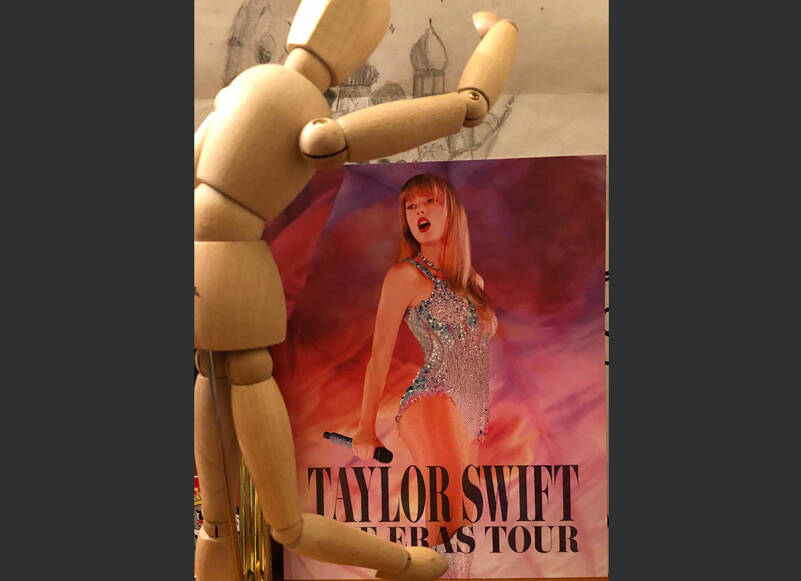By Morf Morford, Tacoma Daily Index
Whether you love her or hate her, there is no avoiding the presence of Taylor Swift.
At minimum, unlike most of us, (at age 33) she has broken plenty of records this past year. Among other things, Swift’s net worth passed the $1 billion mark, according to a new report from Bloomberg.
She has already made $780 million from her 2023 global tour.
Those who could not attend (or afford) her concerts could see a close facsimile on many local screens. That was just one strategy she finagled to garner a higher share of the income generated by her music and tours.
She worked around the major movie studios and partnered directly with movie theatre giant AMC Entertainment to distribute The Eras Tour film, which allowed her to take home 57% of ticket sales.
Another approach was to re-record and release her old albums after the master rights were sold by her original record label. This allowed her to regain creative and financial control of her work while reducing the value of the original albums.
It’s not about the money, at least in the usual sense
Money is very strange when you think about it. In a sense, it is the ultimate human tool, which serves a multitude of services. It is also, as writer Paul Hawken put it, “green energy”, which means it is a tool for getting things done – of transforming places, situations and even human life trajectories.
For many, if not all of us, access to larger amounts of money would probably not change what we would do – we’d just be able to do them sooner – or more often.
Money, like any tool, is best used when we know how to use it. And like most tools, from digital devices to cast-iron cookware, few of us seem to know how to use them either to their fullest potential, or even at minimum, how to not injure or embarrass ourselves.
Here are just a few principles at work in the operation of the Taylor Swift industry
One simple principle, one that will guarantee disaster if you don’t follow it, is almost too basic; don’t be afraid or even reluctant to hire people smarter than you are. Another foundational principle is to not rely on one income stream; to put it at its most simple, generate income from a variety of sources, schedules and categories.
Taylor Swift, for example, besides her extensive and ever-growing catalog of music and merchandise, has a real estate portfolio that’s worth upwards of $150 million. Among other investments, she has purchased properties in locations from Beverly Hills to Cape Cod (and many more) prior to the COVID-19 pandemic – and we all know what real estate prices have done since then.
Giving back
If there is any one principle that those who manage money know well it is that “green energy”, like all forms of energy, dissipates unless it is in motion. Money in an offshore tax-have account may be “safe”, but it doesn’t do anything. That money could be revitalizing a neighborhood, funding a scholarship program or saving a family from homelessness.
Besides necessities, and a few distractions, what would we want our money to do?
In Taylor Swift’s case, she uses it to make difference in the lives of those around her – with a special focus on her fans and those who, often barely recognized or compensated, help the whole system work – to everyone’s benefit.
During the U.S. portion of Taylor Swift’s Eras Tour this past summer, the singer-songwriter stunned truck drivers carrying equipment for her concert shows with a generous bonus of $100,000 each. Around 50 drivers with Shomotion and Upstaging, the two companies in charge of transporting the tour equipment, were called into a production meeting, where, instead of being told that their work was over, were each given handwritten letters from Taylor, with the bonus amount included at the bottom.
Other tour crew members, including those in catering, video, audio and lighting, also received unexpected – and significant – bonuses.
She also made substantial donations to local food banks and relief organizations as her tour progressed across the country.
Besides those, she pledged funds to local and global disaster relief efforts, cancer patients and survivors of sexual assault and even helped one fan with paying off her student loans and at least two moms on the verge of eviction.
As she, or her financial advisor, would know, donating to charities and important causes shows a sense of generosity and awareness of those in need, and in most cases, just might qualify for a tax deduction as well.
In other words, as some among us seem to know, money is, or at least can be, much more than just money.
********
In contrast to these real estate and personnel investments, in the 60s, 70s and beyond, some boomer bands, Led Zeppelin and the Rolling Stones in particular, were notorious for trashing hotel rooms and even throwing television sets out windows, among many other destructive and self-indulgent actions. To put it mildly, those were not prudent investments.





